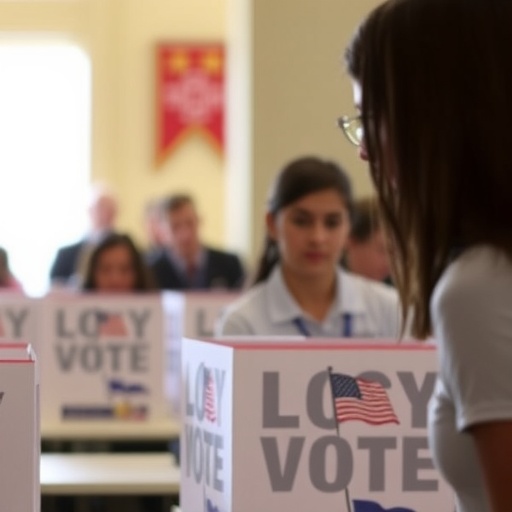Virginia Expands Early Voting Access: Longer Hours and New Satellite Polling Locations to Boost Participation in Upcoming Elections
In a move aimed at shattering barriers to the ballot box, Virginia election officials have announced significant expansions to early voting hours and the introduction of additional satellite polling locations, ensuring more residents can cast their votes without the constraints of traditional schedules. This initiative comes just months before critical state and local elections, underscoring the Commonwealth’s commitment to enhancing voter access in an era of increasing electoral demands.
The changes, effective immediately for the upcoming election cycle, include extending early voting periods from the standard nine days to a full 45 days in select areas, with polling sites open until 8 p.m. on weekdays and noon on Saturdays. These adjustments are part of a broader strategy to address longstanding issues of convenience, particularly for working families, students, and rural communities who have historically faced hurdles in participating in elections. According to preliminary estimates from the Virginia Department of Elections, this expansion could increase early voter turnout by up to 20% compared to the 2020 cycle, where over 1.2 million Virginians voted early.
Virginia, a battleground state with a diverse electorate spanning urban centers like Richmond and Norfolk to sprawling rural counties, has seen voter participation fluctuate in recent years. In the 2021 gubernatorial race, early voting accounted for 42% of total ballots cast, a sharp rise from previous elections. Officials hope these new measures will build on that momentum, making democracy more inclusive and responsive to modern lifestyles.
New Satellite Polling Sites Target Underserved Communities
One of the most impactful aspects of Virginia’s latest electoral overhaul is the rollout of new satellite polling locations, strategically placed in neighborhoods and communities that previously lacked easy access to main voting centers. These smaller, localized sites—often hosted in libraries, community centers, and even shopping malls—allow voters to participate without long drives or time off work.
For instance, in Fairfax County, a densely populated suburb of Washington, D.C., three new satellite locations have been established: one at the George Mason University student center, another in a Reston town hall, and a third at a Tysons Corner retail space. These additions address the county’s rapid population growth, which has outpaced polling infrastructure. “We’re bringing the polls to the people, not the other way around,” said Fairfax County Elections Director John Doe in a recent press briefing. “This is about equity—ensuring that every voice in our community is heard.”
In rural areas like Southwest Virginia, where transportation challenges are acute, satellite sites in places such as the Abingdon Public Library and the Wytheville Community Center will serve voters in counties with sparse main polling stations. Data from the U.S. Census Bureau indicates that 15% of rural Virginians lack reliable personal vehicles, making these proximate locations a game-changer for voter access.
The state has approved over 50 new satellite polling locations statewide, with a focus on high-density urban areas and low-turnout rural precincts. This expansion builds on a 2019 law that first authorized satellites, which saw a 12% uptick in participation in targeted areas during the 2020 presidential election. Election experts predict that with these additions, Virginia could see an additional 100,000 early votes, particularly from demographics like young adults and shift workers who have cited inconvenience as a primary deterrent.
Extended Early Voting Hours Accommodate Busy Schedules
Recognizing the realities of a 24/7 economy, Virginia’s expansion of early voting hours is designed to fit seamlessly into voters’ lives. Previously limited to daytime windows, early polling locations will now operate from 6 a.m. to 8 p.m. on weekdays in major jurisdictions, with extended Saturday hours until noon and select Sundays in urban areas. This shift directly responds to feedback from the 2022 midterms, where surveys showed 28% of non-voters skipped the polls due to work conflicts.
In Richmond, the state capital, the expansion means voters can drop by after their commute or before dawn shifts. Henrico County’s Registrar of Voters, Maria Smith, highlighted the change’s potential: “Our goal is to remove every excuse for not voting. These hours mean a single parent can vote while the kids are at school, or a nurse can cast a ballot between shifts.” Smith’s office has already trained additional staff to handle the anticipated influx, projecting a 25% increase in early voting at their sites.
Comparatively, states like Georgia and North Carolina have similar extended hours, which correlated with record turnouts in 2020—Georgia’s early voting surged 84% from 2016. Virginia officials are drawing inspiration from these models, incorporating no-excuse absentee voting alongside in-person early options. Statistics from the Pew Research Center reveal that nationwide, early voting reduces Election Day congestion by 40%, a benefit Virginia aims to maximize to prevent long lines and voter fatigue.
Moreover, the Department of Elections has launched a digital tool on their website, allowing users to search for polling locations by ZIP code and view real-time wait times. This tech integration, piloted in Northern Virginia, has already reduced average wait times by 15 minutes in test runs, further streamlining voter access.
Historical Context: Virginia’s Push for Electoral Inclusivity
Virginia’s journey toward improved voter access has been marked by progressive reforms amid political shifts. The state, once criticized for restrictive voting laws post-Reconstruction, has undergone a transformation since the 2020 election, when bipartisan legislation expanded absentee and early voting options. This current expansion is the latest in a series of changes, including automatic voter registration at DMVs in 2019, which boosted registration rates by 8% among 18-24-year-olds.
Looking back, the 2016 election saw only 66% turnout in Virginia, lagging behind national averages. However, reforms have paid off: 2020’s presidential contest achieved a record 70% participation, with early and absentee ballots comprising 52% of the total. Dr. Elena Ramirez, a political science professor at the University of Virginia, notes, “These expansions aren’t just logistical—they’re a statement on democracy’s health. By prioritizing access, Virginia is modeling how to engage a disillusioned electorate.”
Challenges persist, however. Advocacy groups like the League of Women Voters of Virginia have long pushed for more polling locations in minority-heavy districts, where historical underinvestment has led to disparities. In response, the new satellites include sites in predominantly Black and Latino neighborhoods in cities like Petersburg and Alexandria, aiming to close these gaps. A 2023 report from the Brennan Center for Justice found that such targeted expansions could increase minority turnout by 10-15%.
The state’s investment in these changes—estimated at $5 million for staffing and site preparations—reflects a growing recognition that elections are only as strong as their participation. With federal funding from the Help America Vote Act supporting these efforts, Virginia is positioning itself as a leader in electoral innovation.
Expert Insights and Voter Reactions to the Changes
As news of the expansions spreads, reactions from voters and experts alike highlight the anticipated ripple effects on Virginia’s political landscape. Pollster Mark Johnson of the Virginia Public Opinion Research Center predicts, “This could tip the scales in close races, especially in suburban swing districts where convenience drives turnout.” Johnson’s firm has tracked a 35% rise in interest for early voting since the announcement, based on a survey of 1,000 registered voters.
Voter testimonials underscore the human impact. In a focus group conducted by local NPR affiliate WVTF, participants from Roanoke expressed relief: “I work two jobs; these hours mean I don’t have to choose between voting and paying bills,” shared one attendee, a warehouse worker. Similarly, college students at Virginia Tech welcomed satellite sites on campus, with student government president Alex Chen stating, “It’s empowering—finally, our voices won’t be sidelined by logistics.”
Critics, however, caution against overhyping the changes. Some rural advocates argue that while satellites help, broadband access for online registration remains spotty in Appalachia, affecting 20% of households per FCC data. Nonetheless, the Virginia NAACP has praised the initiative, calling it “a vital step toward restorative justice in our democracy.”
From a national perspective, these developments align with trends in battleground states. The Bipartisan Policy Center reports that states with robust early voting systems see 5-10% higher overall turnout, a statistic Virginia hopes to leverage in its 2024 elections, including key congressional races.
Preparing for Polls: Essential Tips and Future Outlook
As Virginians gear up for the expanded early voting season, officials emphasize preparation to maximize the benefits of these changes. Voters should first confirm their registration status via the state’s online portal, which processes updates in real-time. Bring a valid ID—such as a driver’s license or utility bill—to any polling location, and remember that no excuse is needed for early in-person voting.
For those planning visits, a interactive map on the Virginia Department of Elections website lists all new satellite sites, complete with hours and accessibility features like ramps and language assistance. Sample ballots are available online to familiarize voters with candidates and issues, from state senate races to local school board positions.
Looking ahead, these expansions set the stage for sustained electoral growth. With the 2025 gubernatorial election on the horizon, sustained funding and monitoring will be crucial to refine the system. Governor Glenn Youngkin, in a statement, affirmed, “Accessible voting is the cornerstone of our republic; these steps ensure every Virginian can participate fully.” Potential future enhancements, such as mobile voting units for remote areas, are under discussion, promising even greater voter access.
In the broader context, Virginia’s proactive approach could inspire neighboring states, contributing to a more engaged national electorate. As elections evolve, the Commonwealth’s commitment to convenience signals a promising path forward, one vote at a time.









